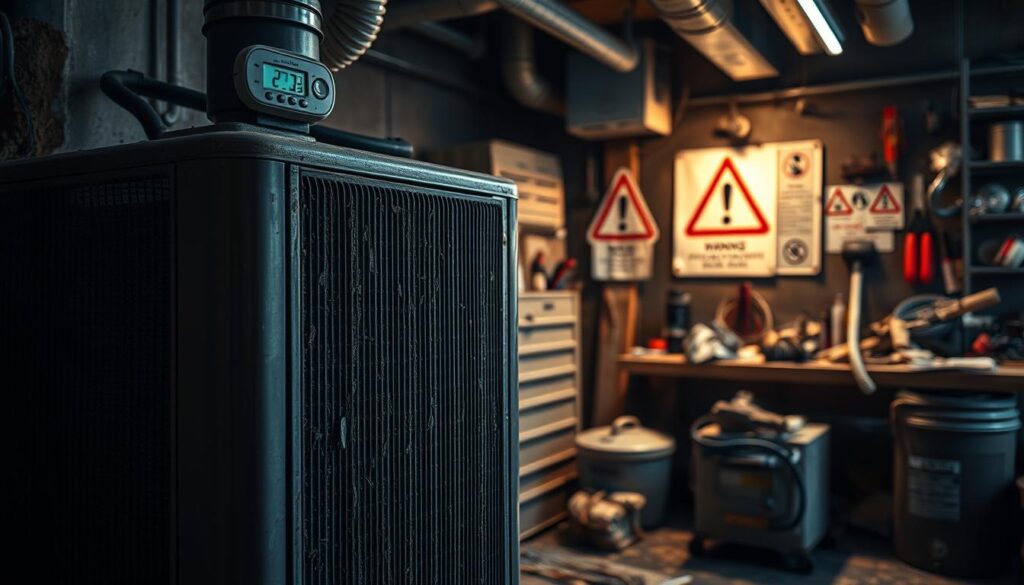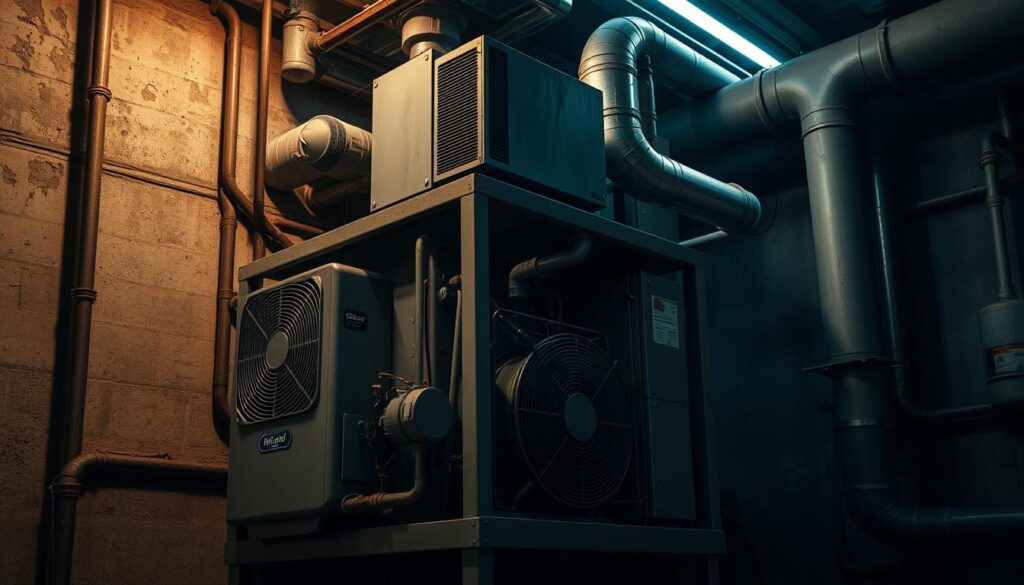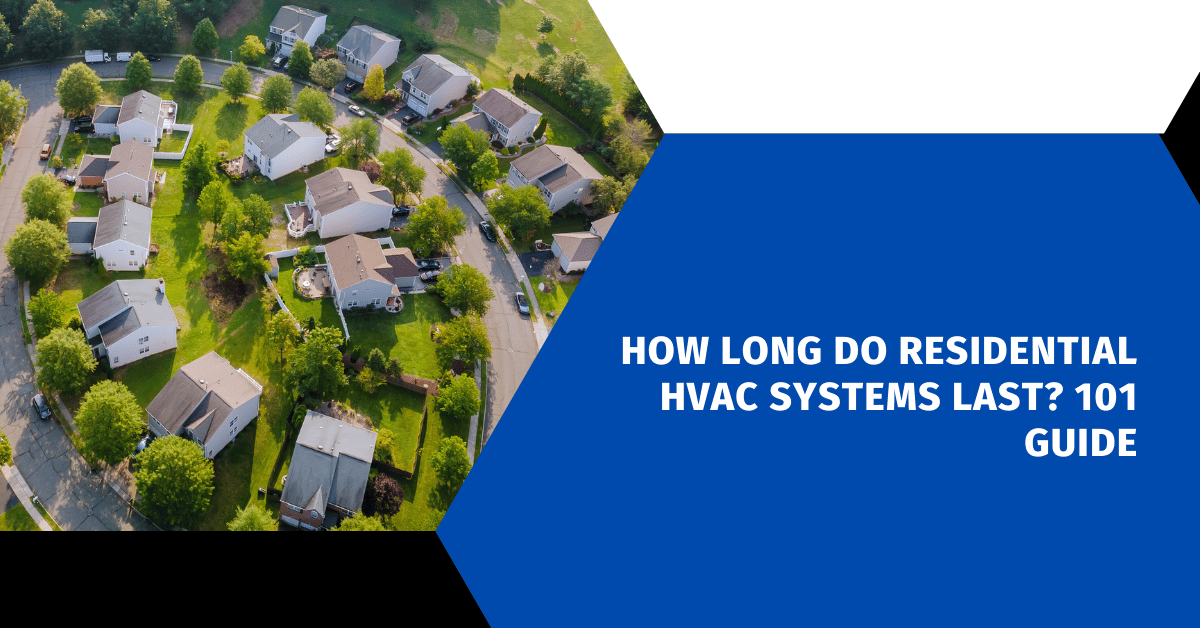Affiliate Disclosure
HVAC Guide Guys is a participant in the Amazon Services LLC Associates Program, an affiliate advertising program designed to provide a means for sites to earn advertising fees by advertising and linking to Amazon.
How Long Do Residential HVAC Systems Last? Are you curious about how long your home’s heating and cooling system will last? Knowing how long an HVAC system lasts is key for homeowners. It helps with budgeting and planning for maintenance.

A typical home HVAC system can last between 10 and 25 years. Its lifespan depends on several important factors. It’s not just about how long it lasts, but also how well it works and how well you take care of it.
Each part of your HVAC system has its own lifespan. Window unit air conditioners usually last about 10 years. Whole-home systems can last around 15 years. Heat pumps, with good care, can last up to 25 years.
Putting time and effort into regular maintenance can greatly affect your HVAC system’s lifespan. Getting professional inspections, fixing problems quickly, and taking care of your system can make it last longer. This helps keep it working efficiently and effectively.
Key Takeaways
- Residential HVAC systems typically last 10-25 years
- Different components have unique lifespan expectations
- Regular maintenance is key for system longevity
- Professional inspections can help predict issues
- Good care can extend your HVAC system’s life
Table of Contents
Understanding HVAC System Basics and Lifespans
Your home’s HVAC system is made up of many parts working together. Knowing about different types of HVAC systems and their lifespans helps you make smart choices about upkeep and when to replace them.
A typical home HVAC system has several key parts. These parts work together to control your home’s temperature and air quality. They also affect how long your heating and cooling system will last.
Core Components of HVAC Systems
- Furnace or heating unit
- Air conditioning system
- Heat pump
- Ductwork
- Thermostat
Average Lifespan Expectations
| HVAC Component | Typical Lifespan |
|---|---|
| Gas Furnaces | 20-30 years |
| Air Conditioners | 15-20 years |
| Heat Pumps | 10-20 years |
| Boilers | 20-35 years |
Factors Affecting System Longevity
How well you take care of your HVAC system affects its lifespan. Several things can influence how long your system will work well:
- Regular maintenance
- Installation quality
- Environmental conditions
- Usage patterns
- Equipment quality
Regular maintenance can greatly extend your HVAC system’s life. This can save you a lot of money on replacements. Simple steps like biannual inspections and regular filter changes can make a big difference.
How Long Do Residential HVAC Systems Last: A Comprehensive Guide
Knowing how long HVAC systems last is key for homeowners. They need to plan their home maintenance budget. HVAC systems usually last between 15 to 25 years, based on several important factors.
Your HVAC system’s life depends on a few key things:
- Quality of initial installation
- How often you get professional maintenance
- Your local climate
- How you use your system
- The type and brand of your system
Different HVAC parts last for different times:
- Furnaces: 15-30 years
- Air Conditioners: 10-20 years
- Heat Pumps: 10-15 years
- Boilers: 15-30 years
“Proper maintenance can significantly extend your HVAC system’s life expectancy.”
Preventative care is very important. Regular checks, changing air filters every 90 days, and fixing small problems quickly can help. This way, you can get the most out of your system.
Keep an eye on your system’s efficiency. If your energy bills go up, you have to fix it often, or the temperature is not steady, it might be time for a new one.
Lifespan of Different HVAC Components
Knowing how long different HVAC systems last is key for homeowners. It helps plan for future upkeep and replacements. Each part of your HVAC system has its own lifespan, influenced by many factors.
- Furnaces usually last 20-30 years with regular care
- Air conditioners can last 15-20 years on average
- Heat pumps last between 10-20 years, depending on use
Furnace Longevity
Your furnace is a big investment in comfort. Gas furnaces can go up to 30 years with good maintenance. Quality of installation, how often it’s serviced, and how much it’s used all affect its life.
Air Conditioning System Durability
Central air units cool your home for 15-20 years. Keeping them well-maintained can make them last longer and work better.
| HVAC Component | Average Lifespan | Key Maintenance Tips |
|---|---|---|
| Furnace | 20-30 years | Annual professional inspections |
| Air Conditioner | 15-20 years | Clean filters monthly |
| Heat Pump | 10-20 years | Bi-annual professional service |
Heat Pump Performance
Heat pumps do both heating and cooling but last 10-20 years. Their performance greatly depends on upkeep and the environment.
Good maintenance can make your HVAC system last longer. This can save you a lot of money on replacements.
Signs Your HVAC System Needs Replacement

Knowing when to replace your HVAC system can save you money and avoid sudden breakdowns. The timeline for replacing an HVAC system isn’t always clear. But, there are key signs that can help you decide between fixing or replacing it.
Here are important signs that your HVAC system might be nearing the end of its life:
- Frequent Repairs: If you’re calling technicians more often than usual, it might be time to consider replacement. Studies show 70% of HVAC systems over 10 years old experience recurring repair issues.
- Rising Utility Bills: Unexplained increases in energy costs can indicate reduced system efficiency. A struggling HVAC unit can increase energy expenses by 10-30%.
- Inconsistent Temperatures: Uneven heating or cooling throughout your home suggests possible system failure.
- Strange Noises or Odors: Unusual sounds or musty smells often point to significant mechanical problems.
The average HVAC system lasts from 15 to 25 years. When repair costs get close to 50% of a new system’s price, it’s more cost-effective to replace it. For example, if a 10-year-old system needs a $600 repair, getting a new one might be a better choice.
Watch out for warning signs like slow thermostat response, increased indoor humidity, and persistent performance issues. These could mean your current system is no longer meeting your home’s comfort and efficiency needs.
Impact of Regular Maintenance on System Longevity
Keeping your home’s HVAC system in top shape is key. It’s not just about fixing things when they break. Regular care is essential for keeping your system running smoothly and lasting longer.
Recommended Maintenance Schedule
Having a regular maintenance plan is vital. It helps your system work better and last longer. Here’s what experts suggest:
- Monthly: Replace air filters
- Quarterly: Clean the outside unit and check the refrigerant
- Annually: Get a full system check from a pro
- Bi-annually: Do a deep clean of the inside parts
Professional vs DIY Maintenance
Homeowners can do some basic upkeep. But, professionals bring a deeper level of expertise. They can spot problems early, saving you from big expenses.
Cost Benefits of Regular Upkeep
Regular maintenance is a smart financial move. It helps avoid big repairs and boosts energy efficiency. You could save up to 15% on your yearly energy bills.
Regular maintenance isn’t an expense—it’s an investment in your home’s comfort and long-term efficiency.
Environmental Factors Affecting HVAC Lifespan

Your HVAC system faces challenges based on its environment. Different climates can greatly affect how long it lasts. Keeping it well-maintained is key for its long-term performance.
Coastal areas pose special challenges for HVAC systems. Salt in the air can cause corrosion, shortening its life from 15-20 years to 7-12 years. It’s important to take protective steps in these areas.
- Coastal areas reduce HVAC lifespan due to salt exposure
- Extreme temperatures increase system wear
- High humidity can cause additional stress on mechanical components
Climate extremes are a big factor in how long an HVAC system lasts. Desert environments with intense heat and arctic regions with prolonged cold both test the limits of HVAC systems.
| Environmental Factor | Impact on HVAC Lifespan |
|---|---|
| Coastal Saltwater Exposure | Reduces lifespan by 30-50% |
| Extreme Heat | Increases wear on compressors |
| High Humidity | Potential mold and corrosion risks |
To protect your HVAC system, consider strategic placement and regular maintenance. You might also need to install protective covers or shields. Knowing these factors helps you make better choices for your HVAC maintenance.
Cost Considerations: Repair vs Replace
Homeowners often face a tough choice when their HVAC system needs work. Should they fix it or get a new one? The cost of this decision can affect your home’s comfort and your wallet.
The $5,000 Rule for HVAC Replacement
Experts use a simple rule to decide between fixing or replacing your HVAC. It’s called the $5,000 rule. Here’s how it works:
- Multiply your HVAC’s age by the repair cost estimate
- If the total is under $5,000, fixing it might be best
- If the total exceeds $5,000, getting a new one is likely better
“The $5,000 rule provides a clear financial framework for making tough HVAC decisions.” – HVAC Industry Expert
Energy Efficiency Benefits
Getting a new HVAC system is more than just fixing the old one. Modern systems save a lot of energy, which can cut down your bills:
- New systems can use up to 35% less energy
- ENERGY STAR® certified products get tax credits
- Today’s models have SEER ratings up to 26
When looking at the cost of installing a new HVAC, remember the long-term savings. The Inflation Reduction Act offers tax credits up to 30% of the cost. This makes getting a new system a smart choice.
Modern HVAC Technologies and Improved Lifespans
Technological advancements are changing residential HVAC systems. They offer homeowners better energy efficiency and longer system lifespans. Modern HVAC technologies have changed how we manage home comfort. They bring smart features that improve performance and cut down energy use.
The latest HVAC energy efficiency innovations include:
- Variable-speed compressors that adjust cooling and heating output
- Smart thermostats with intelligent learning capabilities
- Multi-stage heating and cooling systems
- Zoned temperature control technologies
These new technologies offer big benefits for homeowners. Variable-speed compressors can make your system last longer by reducing wear and tear. Smart thermostats learn your preferences and save energy, cutting your bills by up to 15%.
New HVAC system types use advanced sensors and communication. These innovations allow for predictive maintenance. They help you fix problems before they cost a lot. Modern HVAC technologies keep an eye on your system’s performance in real-time. They alert you to any issues and help keep your system running efficiently.
Investing in modern HVAC technologies is not just about comfort—it’s about creating a more energy-efficient and sustainable home environment.
Tips to Extend Your HVAC System’s Life
Keeping your HVAC system in top shape is key. With a few simple steps, you can boost its energy efficiency and make it last longer.
Regular maintenance is essential for a smooth-running HVAC system. Experts say to get professional checks twice a year. This helps catch problems early and avoids expensive fixes.
- Change air filters every 1-3 months to maintain optimal airflow
- Keep outdoor units clear of debris and vegetation
- Maintain clean air vents and ensure proper circulation
- Use programmable thermostats to reduce system strain
Here are some important steps for your HVAC maintenance routine:
- Clean or replace air filters monthly
- Inspect ductwork annually for leaks
- Check refrigerant levels professionally
- Clean outdoor condenser units regularly
| Maintenance Task | Frequency | Potential Benefit |
|---|---|---|
| Air Filter Replacement | Every 1-3 months | Improve system efficiency by 10-15% |
| Professional Inspection | Twice per year | Extend system lifespan by up to 5 years |
| Outdoor Unit Cleaning | Quarterly | Enhance energy efficiency |
Smart maintenance can reduce energy costs and prevent unexpected breakdowns, saving you money in the long run.
Warranty Coverage and System Protection
Understanding HVAC warranties is key to protecting your home comfort. Most HVAC systems have a standard warranty of 5 to 10 years. Brands like American Standard, Goodman, and Trane offer great protection for your heating and cooling.
When looking at HVAC warranties, pay close attention to the details. Different parts have different coverage lengths. For example, heat exchangers might have a lifetime warranty, while other parts are covered for 5-10 years. You must register your equipment within a certain time to get full warranty benefits.
Home warranties offer extra protection, costing between $300 to $800 a year. They help cover repair costs, with fees from $65 to $125. But, most warranties don’t cover normal wear or damage from bad maintenance. To keep your warranty valid, schedule professional maintenance yearly and keep service records.
Protect your investment by carefully checking warranty terms before buying an HVAC system. Look into extended coverage for extra peace of mind. Remember, regular maintenance and quick repairs are essential for a long system life and warranty protection.

